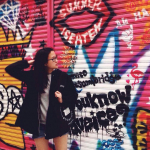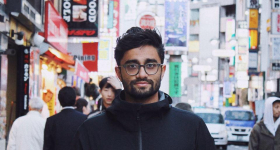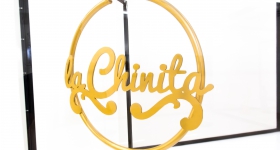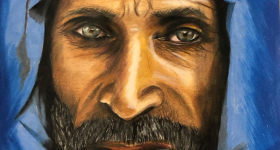For much of the country, the idea of an Asian American rapper can still be a bit puzzling. Yet artists such as Dumbfoundead from the West Coast and Awkwafina from the East Coast have hustled for a long time to establish their legitimacy in the hip-hop world. With their successes, Asian Americans’ credibility within hip-hop has slowly been building. And now, Japanese American rapper G Yamazawa, a North Carolina native, is the next name readers can look to carry the momentum forward.
In 2017, Yamazawa released his debut album Shouts to Durham, which peaked at #37 on the iTunes top 100 rap albums, and his most famous track, "North Cack," has reached nearly one million views on YouTube. I was fortunate enough to have a conversation with him. In our open and honest discussion, the rapper talks about his Durham roots, how he sees himself fitting within hip-hop, the state of America’s political divisiveness and so much more.
You’ve performed at SXSW, toured with Dumbfoundead, released a bunch of music videos for your album, and your most well-known music video for "North Cack" has reached almost one million views. And you’ve even traveled to Japan and South Korea to perform. How do you feel about your career up to this point and the successes that you’ve had?
It’s beautiful. I’m really grateful for the journey overall. I’m so thankful for all the positive influences I’ve had in my life. I feel like in America, especially in entertainment, there’s sort of this story that you tell. It’s sort of like a self-made “didn’t-get-any-help-from-nobody” kind of narrative. But it’s just not true. And, I mean, there’s a lot of elements of my story where I am a real solo-solo kinda dude, and I do feel like there’s been a lot of solitude in this journey for sure, but I couldn’t have done all of this without all of the people supporting me, from any regular individual who just saw me at a show, or someone who sends a message, or a mentor figure in my life.
The title of your album is Shouts to Durham. Why did you decide to dedicate your album to Durham [Yamazawa’s hometown]?
It’s difficult for me to think of large, overarching concepts. I’m more of an intuitive writer, and so when I was putting all the songs together, and I was trying to figure out the arc or theme to the album, Shouts to Durham just was the simplest and most powerful way for me to just describe where I was and how I felt in that moment without having to have a strict metaphorical theme and concept to the present.
What was it about growing up in Durham that was so formative for you?
Growing up in Durham is something I’m so thankful for because it nurtured me into the person that I am. I think it was unique just because of obvious reasons, of me being one of the only Asian Americans in my community and in my schools and growing up with hip-hop. And just what it was like growing up in a small town in America is just different from an L.A., New York, Miami … we don’t really have numbers, but we have a lot of heart. I think it allowed me to kind of stay levelheaded and keep carrying this kind of simplicity with me that I’m proud of.
In that kind of environment, how did you see yourself fitting in? You said that you were one of the few Asians around you?
You sort of build like, I like to call them “sensibilities.” When you talk about it in hindsight, it gets really brushed over, and there are sweeping images that you see, but it’s an everyday moment-to-moment daily life kind of experience, where you build sensibilities based on the kind of people that you like and like you. You have a sort of mutual exchange and sharing of culture and of just friendship and love. I’ve had a lot of white friends, I had a lot of black friends, I had a few Latino homies, and I think where I just tended to feel most comfortable was around my black homies. And it felt like I was allowed to dress the way I wanted to dress, and be who I wanted to be, and test out who I wanted to be, in a way, within the umbrella of hip-hop.
Right. So, by “sensibilities,” you mean testing out to see where you are most accepted, where you are most comfortable and where you feel free to be most like who you are?
Absolutely. And for me, because I’m Asian and because I stick out so much, and even beyond that, growing up with the belief system of Buddhism in the Bible Belt, and just knowing that deep down, we have very different views … just trying to live with that and navigate that, and trying to not just go with the flow … I think I was just forced to ask myself those questions at a much earlier, more rapid and much more intense kind of rate.
By asking these questions, is that how you found poetry, spoken word and rapping?
No, I found poetry because poetry kind of found me. When I was a freshman in high school, a teaching artist came in and related poetry to Tupac. She brought in The Rose That Grew from Concrete. That was the first time I felt that poetry meant something to me. One of my best friends in my neighborhood passed away when I was in eighth grade and writing and performing at that time was just a way for me to have the conversations with myself, and process grief, and process regret and process just pain. Both writing and just listening. I think people love art because it allows them to have painful dialogues with themselves via a song or a video or a film or whatever it is. Poetry … it was a bit of an exchange for sure.
So, it was like an outlet for you to express all of the past trauma in your life and all of the grief?
Yeah, I mean, also, I have a crazy ego. I love the stage, I felt very insecure for a lot of my life. Still do in many ways, wanted to be loved, wanted to be praised, wanted to be in the spotlight. I think a lot of artists work off of that system as well, where, sometimes they’re self-conscious, and it takes some maturity to realize that about yourself. It’s just a deep sense of insecurity that you’re trying to overcome by performing well in front of strangers.
At what point did you decide to dedicate your life to art? When did you know?
I feel it was like super young, man! I had some cool influences when I was a kid, and certain touring artists that came through that I was able to meet, and comics and illustrators, and realizing that people not only made livings, but also made names for themselves and were remembered in time because of their art. So, I think it started for me before I even picked up rapping. I wanted to be a visual artist at 9, 10, 11, and then I wanted to be a dancer, and then rap came around 12 to 13. But if I were to put a number on it, I’d say 16 was when I was like, “I’m gonna rap for a living. I’m going to be the greatest rapper ever.” All of it was really building up at that time, and that was probably the time I was having the most trouble in my life as well.
When you started performing and putting yourself and your music and your poetry out there, what were people’s reactions to you?
Ahh, people generally are nice!
Especially if you’re that young, you know? Generally, people are very supportive. It’s not like I was rocking big crowds, and I had to learn how to perform in predominantly black audiences my whole life, especially at a young age. So, it was cool. I’m very used to the experience of walking into a venue, maybe with a homie or two, and people looking at me crazy, like what am I doing here? Who is this clown? And on my way out, every person in the building stopped to say something. Just watching a room shift.
That makes me glad, because I think this idea of an Asian looking rapper in the United States is still a bit of a mismatch. Especially because in the media, Asians are perceived to be passive, nerdy or submissive, and Asian men in particular are seen to be weak, subordinate, not masculine nor desirable. And even on top of that, because you’re not black, maybe people will think that you’re appropriating black culture. How do you reconcile these ideas about being a rapper who also happens to be Asian American?
Like I said, that scenario, that started when I was like 13. So, the scenario of walking into a cypher (people/rappers gather together to jam, freestyle together or battle each other), or just walking down my hallway in middle school wearing what I was wearing, having the friends that I had. What I also like to start these conversations with is that all of the claims and the questioning, the apprehension is super legitimate, and it’s super real, and it’s not just an intellectual matter. It comes from a very deep history, a very deep cultural issue and conflict, so I understand it. And I come from it. So, when it comes to writers or bloggers, or the media questioning my position as an Asian emcee in a public sphere, it’s like an of course. It’s something that comes with it. And it’s something that I don’t take lightly.
In a 2017 issue of the New Observer you mentioned that, “although I do feel a responsibility to advocate for those with similar life experiences, I wanted to stress that it’s not something I feel obliged to do to be taken seriously as an artist.” What do you mean by that?
I label myself an artist, and an artist to me entails that I have the responsibility of expressing what feels true to me as a human. And race is a big part of that. But so is regret, and so is mischief, and so are mistakes and grief, and so are love and peace and violence. And a lot of things transcend racial distinction. Those are things that are very important to me, and those are things that I’ve had to navigate in my own head just as a human. What is it about my black friends that’s the same as my white friends that’s the same as me? What are things that we share? How do these things change because of race? That’s important to know. But I want to tackle the key elements of the human experience. I’ve seen a lot of Asian American artists over the years, and this is in art and just in society, the societal habit of wanting to build camaraderie around your ethnic group but ultimately alienating yourself from the whole American experience. And even just the Asian [American] experience in and of itself is so big! It’s so expansive. The political history of the Asian diaspora is so thick. So, for me, what’s most important is introducing eastern thinking, not so much forcing myself to speak about Asian American politics because I feel like it’s something that I have to do.
For PBS NewsHour in 2015, you said: “I think hip-hop is all about individuality and exposing who you are unapologetically … and all of my poetry was about trying to understand who I am.” Can you explain why poetry and hip-hop was the perfect medium for you to do all of that?
I think it’s just what naturally surfaced throughout the years. I sometimes liken it to my experience with dual languages, being bilingual, and having kind of a behind-the-scenes perspective of what words mean and how many meanings words can have; how things change depending on how you say it. So, when it comes to language and diction and accent and dialect, having parents with broken English, but growing up American, and having a native American dialect, but then sort of that triangulation between black and white culture and code-switching, and I think language and wiring is something that always was intriguing to me.
Probably naturally I just gravitated toward the emcee because he was the one, you know, I grew up in the commercialization of hip hop, and the rapper became the one on the forefront. I imagine all of that propaganda.
But ultimately, I love journaling and I love writing. I love my own handwriting, as egotistical as that is, too. I really love graffiti, and I really love expressing myself through transcription and I think that’s just how it naturally developed.
But it looks like you’ve been able to put your own spin on authenticity and you’re able to put out work on what authenticity means to you.
I think we get tricked into thinking that our story itself is not interesting enough for the world. And we’re tricked into thinking that we need to have this, this and this for your story to be interesting. But, I was raised to believe the ordinary person is just a phenomenon. Every living thing on this earth is such a miracle that I think everyone’s story is so amazing and intriguing and interesting and historic. And so, I think it’s sad when I see artists following an idea that they think they need to attach themselves to in order to be successful.
In general, what are your hopes for the future and what kind of takeaways do you want people to have from your work?
My hope for the future is that our culture in America, particularly, can really take the lead in the world when it comes to finding ways to … change our culture of violence, change our culture of self-centeredness and really view ourselves in the global hierarchy of things, understand our position in the world and try our best to change the culture in all fields of work: in art, in economics, in law, in politics, in architecture, in housing, in all of it. I hope that folks can actively believe that they can influence and change the culture that we live in, and that we’re providing for our children.
G Yamazawa just released his sophomore album, Money is Time. You can listen to it on iTunes or Spotify.










Comments